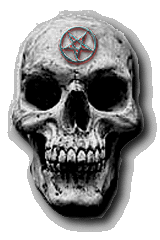
Satan is Death
https://www.dpjs.co.uk/death.html
By Vexen Crabtree 2003

Page contents:
1. Satan Represents Death
#buddhism #christianity #death #islam
Everything Dies
Satanism is about reality. In reality, all living beings die. There are no exceptions. Satanism, in embracing life and indulgence, is in effect striving against death. However, it is inevitable that death will eventually win. Satan, representing reality and the Human condition, symbolizes the victory of death. This eternal truth is more meaningful and potent than deceitful symbols of life, of reincarnation and of other spiritual pipe dreams.
“There is no heaven of glory bright, and no hell where sinners roast. Here and now is our day of torment! Here and now is our day of joy! Here and now is our opportunity! Choose ye this day, this hour, for no redeemer liveth!”
"The Satanic Bible" by Anton LaVey (1969)1
The Book of Satan IV:2
There is a symbol of death in many religions. In Christianity it is Satan, and is Islam it is Shaitan, a very similar being. In Buddhism, Māra is the name given to the symbol of death2.
“It is in its connexion with death, but particularly the overcoming of death, that Māra is often mentioned in the Canon. In this context death is always regarded as an evil, the unwelcome Antaka, the ender of an existence which is not ready to be ended...”
"Buddhism and the Mythology of Evil" by Trevor Ling (1997)3
Deadism
Although I have never seen this as a principal or aspect of a Satanic group, or any other group, I have seen it occur in enough individuals for me to include it here and name at "deadism": the belief that you are a deadite. (It's not related to the third Evil Dead film, "The Army of Darkness", where the Deadites are an army of the dead.)
A deadite is a person who strongly feels that if souls exist, then they don't have one. Vexen is a deadite. We believe that if Heaven exists, we cannot go there. We believe that our time will come, that there is no afterlife for us no matter what theology we take a paradigm shift into. We believe that if Satan and God will commandeer armies in the Biblical wars of Revelations, then we are to fight on the losing side of Satan. In Nordic ragnarok we are the forces of Wotan, of Loki, who fight with inhuman strength against Odin. We will not release our attachments to this world and attain Buddhist or Hindu Nirvana.
Not only are we rejected from these eschatological rewards by our love of life, but we reject the rewards themselves as confusing errors and spiritual pipe dreams. If after death there was an all-pervading, universalistic non-dualistic entity that granted eternal life to everyone, regardless of their beliefs, I would have to accept (and Deadism would not be a valid belief), also I do choose life over death. Deadism is a relevant and coherent belief principally in dualistic belief systems.
As we shall see in part two of this text, teleological deadism is nihilistic and pessimistic but only in a way that focuses real life and happiness and not in a way that induces suicide, as life here and now is more urgent (no afterlife).
- Justification for Deadism is that we do not believe God is moral, nor that Heaven is good. See "Pascal's Wager is Safer in Reverse: Picking a Religion is Dangerous Business" by Vexen Crabtree (2010)
2. Vitalize Your Life
#dead_bodies #death #funeral_directors #humour #new_age #satanism #self_development #sogyal_rimpoche #soldiers
Having accepted the truth of the inevitable victory of death over all personal endeavours, what is the result? Should a person reject this truth and retreat into New Age mysticism, or the spiritual pipe dreams of popular religion, and try to hide the uncomfortable truth that life is only a temporary result of biology, and not a divine creation? The answer is no; on the contrary: failure to accept death is negative.
Over a hundred years ago the psychologist William James taught that normal Human beings hide death away. Later David Clark in "Sociology of Death, the" (1993)4 devotes a chapter to the way that we in the West, have secluded all things bloody from common sight. We clinicalize death, so that only trained professionals have anything to do with the practical side of blood, slaughter, bodies, funerals and burials5,6. This denial of reality extends far and wide amongst the masses. Dead bodies do not litter the floor of battlefields in films and in computer games corpses fade away majestically and discretely. We are so far removed from the natural cycle of life that some parents even worry about how to explain to their children about where beefburgers and sausages come from. Even one's own future death hardly features in public angst, except where the subconscious, desperate, finds expression in dreams.
“We divert our attention from disease and death as much as we can; and the slaughter-houses and indecencies without end on which our life is founded are huddled out of sight and never mentioned, so that the world we recognize officially in literature and in society is a poetic fiction far handsomer and cleaner and better than the world that really is.”
"The Varieties of Religious Experience" by William James (1902)5
People who deal with death, including the likes of soldiers, mortuary workers and Funeral Directors staff, must outgrow the attitude towards death where the topic is steeped in permanent seriousness. Anton LaVey writes that those who work close to death frequently often develop a profound and sanity-saving sense of humour about this dark topic. He notes that "a larger than average number of humorously-inclined professionals" can be found attending to the business of death7. When it comes to discussing the threat of death and the reality of mortality, the apparently rapid-as-a-flash wit of soldiers can seem callous and inappropriate to outsiders. In reality, their approach is life-preserving. Don't let the threat of death diminish our lives while we are still alive! Embrace death! Make fun of death by enjoying life - this is perhaps the only mastery we can ever have over death.
“Sogyal Rimpoche, a Tibetan Lama who has written on the subject of death and dying, examines the issue thus: 'At the moment of death our life becomes clear. Death is our greatest teacher. But, unfortunately, people in the West think of death only when they are dying. This is a little bit late'.”
Sogyal Rimpoche hadn't met any Satanists when he spoke of Westerners. Satanism shows us that accepting the inevitability of death is life-affirming. If you are subject to imbalance or herd mentality, you may be indoctrinated with commentary about death and Satan that are negative and restricting. If you cannot overcome these, you cannot accept Satan as a symbol of death, and perhaps a different religion is more suitable for you than Satanism...
My page "Surviving Death and the Meaning of Life" by Vexen Crabtree (2016) has more on the psychological studies into the vitalizing motivation that comes from facing death.
The victory of death over life is inevitable. Both the introverts and extroverts gain from the acceptance of Satan as the clearest symbol of death, worthy of exaltation. Not wanting to waste their life, those who embrace death focus on positive experiences and enriching lifestyles rather than ones that are either too compulsive or too introspective. Compulsion is a lack of freedom and vitality, and nihilistic internal despair is a lack of Satanic energy. By accepting Satan, you are accepting a saviour from death. To look to the skies for redemption from death is an imbalance, a distortion of healthy life-embrace in favour of emotional drunkenness. The stupefying effect of a belief in afterlife denies the truth of the matter, whereas life-empowerment through the acceptance of death is revitalizing.
“Life is for the living. Death, too, is for the living. If you are fascinated or entertained by death, make the most of it while you're alive. When you are really dead, it won't hold any interest at all.”
"Satan Speaks!" by Anton LaVey (1998)9
“The flames of Hell burn fierce and purify!”
"The Satanic Bible" by Anton LaVey (1969)1
The Book of Satan introduction.
